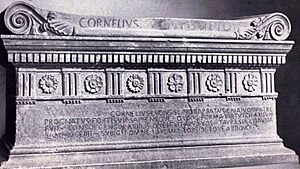Lucius Cornelius Scipio Barbatus facts for kids
Lucius Cornelius Scipio Barbatus (born around 337 BC, died around 270 BC) was an important Roman leader. He was one of the two elected consuls (like a top leader) in 298 BC. He led the Roman army to victory against the Etruscans near Volterra. He belonged to the famous Roman family called the Scipiones. He was the father of Lucius Cornelius Scipio and Gnaeus Cornelius Scipio Asina. He was also the great-grandfather of the very famous general, Scipio Africanus.
Contents
Leading Rome's Armies in the Third Samnite War
Barbatus became a very important patrician (a member of a noble Roman family) officer during the Third Samnite War. This was a major war where Rome finally defeated a group of its neighbors. These included the Etruscans, the Umbrians, the Samnites, and their allies, the Gauls. Rome's victory in this war helped it become the leader of most of Italy.
The Battle of Volterrae, 298 BC
Before 298 BC, war had already started between Rome and Etruria. The Etruscans wanted to invade Rome with some Gallic allies they had hired. This attack broke an old peace treaty with Rome. The Gauls changed their minds, so the Etruscans faced a Roman army alone.
In 298 BC, Barbatus became a consul along with Gnaeus Fulvius Maximus Centumatus. People from Lucania asked the Roman Senate for help. They said the Samnites were destroying their land. Rome agreed to protect them if they signed a treaty. Rome sent messengers to tell the Samnites to leave Lucania. But the Samnites threatened the messengers. So, the Roman Senate declared war on Samnium.
Barbatus was chosen by chance to lead the army in Etruria. The Etruscans attacked right away near Volterra. The battle lasted all day, but neither side won clearly. During the night, the Etruscans left their camp and equipment. They went back to their strong cities. Barbatus then led a small, fast army to destroy the countryside.
The Battle of Tifernum, 297 BC
The next year, the Etruscans asked for peace. The new consuls, Fabius Rullianus and Decius Mus, led both Roman armies against Samnium. Barbatus served as a legatus (a high-ranking officer, like a lieutenant general) under Fabius Maximus.
As they marched into Samnium, the Samnites hoped to trap them in a valley at Tifernum. They placed a small force there to trick the Romans. Their main army was hidden in the hills behind. Fabius saw through their plan. He moved his army into a strong formation. The Samnites then came down to fight a regular battle.
Fabius couldn't win easily. So, he sent some of his soldiers, led by Barbatus, secretly around the enemy's side. They were to attack from the hills behind the Samnites. The plan didn't go perfectly. A Roman cavalry charge happened too soon and was pushed back. The Samnites started to break the Roman line. But then Barbatus's men appeared on the hills. The Samnites thought it was the second Roman army. They quickly ran away, leaving behind many dead and prisoners.
Campaigns in 296 BC
After defeating the Samnite army, the consuls spent five months taking control of Samnium. After new elections, they were ordered to continue the war. The Samnite army, led by Gellius Egnatius, left Samnium. They offered their help to Etruria, which was accepted. Egnatius also brought in the Umbrians and hired Gallic fighters. He convinced the Etruscans to attack Rome.
Rome learned about this new danger. The Senate sent Appius Claudius to Etruria with two legions and allied troops. There were several battles that didn't have a clear winner. The other consul, Lucius Volumnius, was helping in Samnium. He then went to Etruria to help Claudius.
Claudius was not happy to see Flamma and told him to leave. But Claudius's own officers insisted that Flamma stay. The soldiers cheered so loudly that the enemy heard them. The Romans then attacked fiercely. They defeated the combined enemy force, killing many and taking prisoners.
Meanwhile, the Samnites raised another army. They invaded and robbed Campania. Flamma quickly marched there. He learned the Samnite army was at the Volturnus river, heading back to Samnium. In the Battle of the Volturnus in 296 BC, Flamma's army waited in ambush. At dawn, Flamma let part of the Samnite army march out. Then he attacked, splitting their forces. The fighting moved into the Samnite camp. Roman prisoners held by the Samnites freed themselves and joined the fight. The Romans won, killing many and taking prisoners. They also freed many Roman prisoners.
News reached Rome that Gellius Egnatius had formed another large army in the north. This army included Samnites, Etruscans, Umbrians, and Gauls. The Senate was worried. They ordered all Roman males, even teenagers and older men, to join the army.
A Turning Point in 295 BC
In 295 BC, new consuls were elected: Fabius Maximus and Decius Mus. Appius Claudius became a praetor (another important Roman official). Fabius Maximus insisted on leading the army in Etruria. The Senate agreed. He went to Etruria and took command from Claudius. Barbatus was still serving under Maximus. Maximus sent Barbatus to command the Second Legion at Clusium.
A Roman Censor
When he died, Barbatus was a censor in 280 BC. A censor was a Roman official who kept track of citizens and their property. This was the first time a reliable record of a censor's work was kept, even though the position was very old.
His Sarcophagus and Epitaph
The Sarcophagus of Lucius Cornelius Scipio Barbatus was found in the Tomb of the Scipios. It is now in the Vatican Museums. This stone coffin has his epitaph (a message written on a tomb) carved on it. It is written in old Latin poetry.
See also
- Scipio-Paullus-Gracchus family tree
 | Aurelia Browder |
 | Nannie Helen Burroughs |
 | Michelle Alexander |


